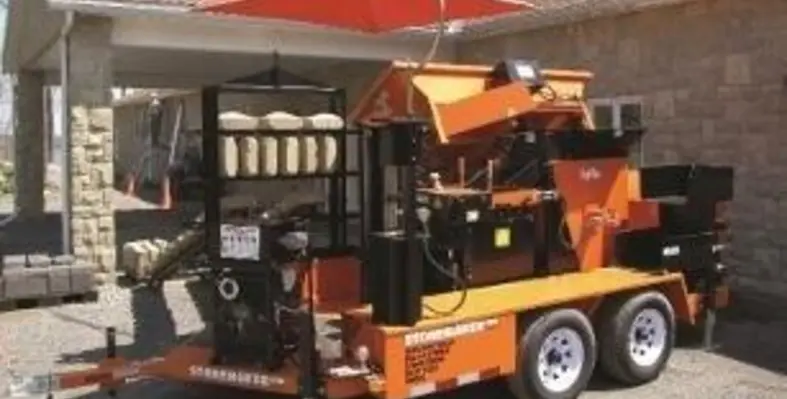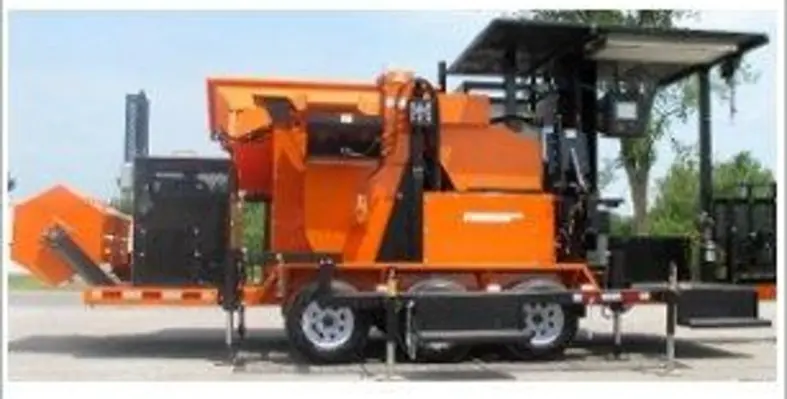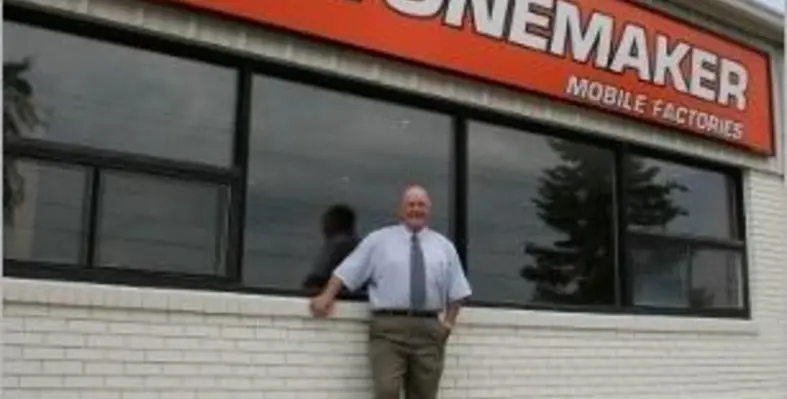A Canadian invention is aiming to steer a development boom in Africa.
“When I was told that some items were not commercially available, and what I could get would cost over a quarter of a million dollars, I was astonished,” says Troke, 65. “I knew that basic concrete is made from portland cement, sand and water and that this formula employed by the Romans some 2,000 years ago hadn't changed much since.”So why the high cost?With a little research he discovered that materials typically make up only about 10 per cent of a product's price. The greatest expense lies in the high capital costs of constructing and operating a concrete processing mill and then the transportation of finished products to the job site. So Troke, with a keen sense of the practical, and experience with such diverse undertakings such as uncluttering choked waterways in Africa, textile processes in Egypt and designing commercial display systems for North America, got down to the business of developing what has come to be known as Stonemaker.Innovation and ingredients for industryBegun as a means to produce 8 inch square concrete stones in high volume, it has over the course of nine years been continuously developed and refined to the point where it is now a portable, completely self-contained concrete factory. Stonemaker has two main features that could have a significant impact on build projects throughout Africa; its ability to manufacture practically any concrete product, from stamping out pave stones and bricks and pouring foundations and curbs to pressing hollow blocks and even roof tiles; the second point is portability. The factories are trailer-mounted and towable, so they can be brought directly to the work site behind a truck or delivered by barge.“What really defines Stonemaker is not only its ability to go anywhere you can take a truck, but the range of products it produces once it's there,” says Troke. “The only things you need to bring to a job site is cement powder and diesel fuel to run the power plant. The other requirements are normally already on site.”Concrete is produced by combining three base ingredients; aggregate (sand and/or stone), cement powder (commonly referred to as portland) and water, which acts as a catalyst between the aggregate and portland and allows them to bind together, providing hardened products.Within the industry there are two basic variants of concrete used; wet or ready mix, which is used for pouring foundations, support columns, or anywhere that concrete needs to flow into cavities or be pumped. The other is known as dry mix, used for manufacturing blocks, bricks, stones, pavers, etc. Dry mix, as the name suggests, utilizes little water and when formed in a compression chamber, produces a very durable product at a quickened cure rate. To switch from production of one to the other, you adjust the amount of portland, water and possibly the aggregate size. Until now, each production type was distinct and normally produced at separate facilities. “We've brought them together and allow the user to change from one production type to the other in seconds by simply adjusting the ingredient inputs via factory control panel. Ultimately, what we wanted to offer was the capacity to produce differing sizes of solid blocks or bricks with the dry mix, be able to switch over to pouring for a foundation with wet mix or over to hollow block manufacturing, all with minimal disruption in the production cycle. It was a tremendous challenge, but these are the needs on practically any build site, you have to have all the capabilities or you're just a niche product,” says Troke.The concept has won not only critical acclaim, but recognition for innovation.“When we had the attorneys conduct a global search of its patentability, we were amazed with the results,” says Troke. The search conducted in 2009 by Canada's top patent agents, Gowling, Henderson and Lafleur, revealed that not only did they have 57 claims to originality, but that they would receive a concept patent in all 141 countries that are members of the World Intellectual Property Organization.“A concept patent is the holy grail of patents, and one of extremely high value,” adds Troke.Either of the two current factory configurations; one of which is higher volume and more computerized, manufactures products as structurally sound as those from established mills. “Ingredient and mix consistency are essential where building standards are to be maintained,” says Troke.“Preparing concrete is like preparing any recipe,” he says. “If you don't use the right amount of ingredients and if they aren't mixed properly, you are not going to get the best results.”To ensure standards can be met and maintained, Stonemakers include a test mechanism on each factory so products can be tested before being applied.
“Currently it can take a week or more to send samples out and get results back, remote locations can offer even more protracted result time and this invariably adds to job costs,” says Troke.The company signed off on field testing several months ago and is now beginning the domestication phase of the patents within WIPO member states. This allows commercial application to get underway in North America and abroad. Although the company has just commenced marketing/sales, word is beginning to spread.“We've held preliminary discussions about emergency relief assistance, military application and a whole host of needs. We view developing nations, and Africa in particular, as a very important element in our overall corporate strategy. Our plans are to begin licensing agreements and joint venture partnerships across Africa beginning later this year, ” says Troke.“Not only do we see thousands of factories being applied commercially, but we'll be partnering with governments and NGOs to help facilitate Low Cost Housing Units (LCHUs) and infrastructure builds where it wasn't feasible before.”Stonemaker at the centre of productionAccording to United Nations estimates, there are currently more than one billion people worldwide with either inadequate housing or no housing at all. Additionally, the UN calls for the construction of some 21 million LCHUs every year for the foreseeable future.“In the developed world, we see Stonemaker's factories as being used for somewhat different purposes than developing nations, but there are many similarities. Lowering build costs is a major concern anywhere,” says Troke. “Not only do we reduce product costs by some 85 per cent, but Stonemaker factories are used as a means to customize projects and allow tailoring builds to customer demand. The same thing applies in developing nations. Individualizing projects will play an ever increasing role and allow the factories to move to production of higher value products over time.”While visiting Stonemaker's world headquarters, Mr Steve Fitzgibbon commented that “Stonemaker will be a game changer throughout the developing world”. Mr Fitzgibbon is a director of BAM International and is currently involved in the reconstruction of Haiti and development in Ghana.Initially, the company will build Stonemaker factories at its production centre in Perth, Canada and ship via container to their final destinations. Research and development and operational training will initially take place in Canada as well. Eventually, the company would like to see manufacturing and more technical responsibilities take place in Africa.“We view ourselves as a technology and licensing organization and want the factories locally made wherever practical. Our plans are completely in sync with the UN's call for more manufacturing across Africa,” says Troke. “We've spent three years doing developmental work on Stonemaker in Egypt and indeed, some of the components are sourced there. Africa provides great opportunities from all standpoints.”Though the concept was originally intended for American and European markets, Troke says the more they studied it, the more they realized the possibilities for application in the developing world. There are numerous factors, he states.“In most cases there is limited or no access to building supply centres and even if there was, holding the massive amounts of inventory that a portable factory is capable of producing would render the products cost prohibitive outside most urban settings. We aim to make procurement and transportation a less significant factor in build projects and bring the costs down by an average of 70 per cent in the developing world.” Additionally, Troke says Stonemaker's low capital cost makes financing feasible and not requiring site impact or environmental assessments makes the paper work much easier.“Though we recognize challenges still need to be overcome, the technology is now both affordable and available. By working with local partners, we intend to play a major role in developing Africa's housing and infrastructure,” Troke says. “It is a concept that's time has come and one that's worth building on.”For more information visit www.stonemaker.comStarr Marks - Stonemaker, Inc.














